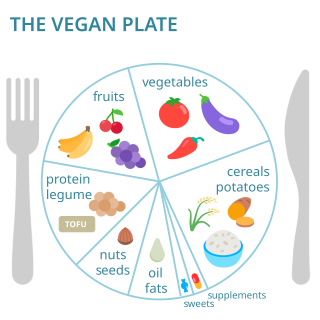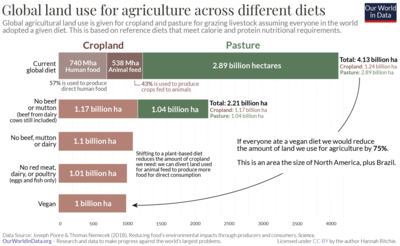
Veganism is the practice of abstaining from the use of animal products, particularly in diet, and an associated philosophy that rejects the commodity status of animals. An individual who follows the diet or philosophy is known as a vegan. Distinctions may be made between several categories of veganism. Dietary vegans, also known as "strict vegetarians", refrain from consuming meat, eggs, dairy products, and any other animal-derived substances. An ethical vegan is someone who not only follows a plant-based diet but extends the philosophy into other areas of their lives, opposes the use of animals for any purpose, and tries to avoid any cruelty and exploitation of all animals including humans. Another term is "environmental veganism", which refers to the avoidance of animal products on the premise that the industrial farming of animals is environmentally damaging and unsustainable.

Vegetarianism is the practice of abstaining from the consumption of meat. It may also include abstaining from eating all by-products of animal slaughter.

Vegetarian cuisine is based on food that meets vegetarian standards by not including meat and animal tissue products. Lacto-ovo vegetarianism includes eggs and dairy products. Lacto vegetarianism includes dairy products but not eggs, and ovo vegetarianism encompasses eggs but not dairy products. The strictest form of vegetarianism is veganism, which excludes all animal products, including dairy, honey, and some refined sugars if filtered and whitened with bone char. There are also partial vegetarians, such as pescetarians who eat fish but avoid other types of meat.

A lacto-vegetarian diet is a diet that abstains from the consumption of meat as well as eggs, while still consuming dairy products such as milk, cheese, yogurt, butter, ghee, cream, and kefir.

In nutrition, diet is the sum of food consumed by a person or other organism. The word diet often implies the use of specific intake of nutrition for health or weight-management reasons. Although humans are omnivores, each culture and each person holds some food preferences or some food taboos. This may be due to personal tastes or ethical reasons. Individual dietary choices may be more or less healthy.

A plant-based diet is a diet consisting mostly or entirely of plant-based foods. Plant-based diets encompass a wide range of dietary patterns that contain low amounts of animal products and high amounts of plant products such as vegetables, fruits, whole grains, legumes, nuts and seeds. They do not need to be vegan or vegetarian but are defined in terms of low frequency of animal food consumption.
An economic vegetarian is a person who practices vegetarianism from either the philosophical viewpoint that the consumption of meat is expensive, part of a conscious simple living strategy or just because of necessity. In the developing world, where large numbers of poor people might not be averse to eating meat, they are regularly forced to not eat it, since meat can often be a luxury.

Christian vegetarianism is the practice of keeping to a vegetarian lifestyle for reasons connected to or derived from the Christian faith. The three primary reasons are spiritual, nutritional, and ethical. The ethical reasons may include a concern for God's creation, a concern for animal rights and welfare, or both. Likewise, Christian veganism is not using any animal products for reasons connected to or derived from the Christian faith.

Conversations regarding the ethics of eating meat are focused on whether or not it is moral to eat non-human animals. Ultimately, this is a debate that has been ongoing for millennia, and it remains one of the most prominent topics in food ethics.

Environmental vegetarianism is the practice of vegetarianism when motivated by the desire to create a sustainable diet that avoids the negative environmental impact of meat production. Livestock as a whole is estimated to be responsible for around 15% of global greenhouse gas emissions. As a result, significant reduction in meat consumption has been advocated by, among others, the Intergovernmental Panel on Climate Change in their 2019 special report and as part of the 2017 World Scientists' Warning to Humanity.
World Vegetarian Day is observed annually around the planet on October 1. It is a day of celebration established by the North American Vegetarian Society in 1977 and endorsed by the International Vegetarian Union in 1978, "To promote the joy, compassion and life-enhancing possibilities of vegetarianism." It brings awareness to the ethical, environmental, health, and humanitarian benefits of a vegetarian lifestyle. World Vegetarian Day initiates the month of October as Vegetarian Awareness Month, which ends with November 1, World Vegan Day, as the end of that month of celebration. Vegetarian Awareness Month has been known variously as "Reverence for Life" month, "Month of Vegetarian Food", and more.

Vegetarian and vegan dietary practices vary among countries. Differences include food standards, laws, and general cultural attitudes toward vegetarian diets.
Sustainable diets are defined as "those diets with low environmental impacts that contribute to food and nutritional security and to healthy lives for present and future generations. Sustainable diets are protective and respectful of biodiversity and ecosystems, culturally acceptable, accessible, economically fair and affordable, are nutritionally adequate, safe, and healthy, and optimize natural and human resources." These diets attempt to address nutrient deficiencies and excess, all of the while covering ecological phenomena such as climate change, loss of biodiversity and land degradation.

Pescetarianism is the practice of incorporating seafood into an otherwise vegetarian diet. Pescetarians may or may not consume other animal products such as eggs and dairy products. Approximately 3% of adults worldwide are pescetarian, according to 2017–2018 research conducted by data and analytics companies.

Vegan nutrition refers to the nutritional and human health aspects of vegan diets. A well-planned, balanced vegan diet is suitable to meet all recommendations for nutrients in every stage of human life. Vegan diets tend to be higher in dietary fiber, magnesium, folic acid, vitamin C, vitamin E, iron, and phytochemicals; and lower in calories, saturated fat, cholesterol, long-chain omega-3 fatty acids, vitamin D, calcium, zinc, and vitamin B12.
Non-vegetarian food contains meat, and sometimes, eggs. When describing people, non-vegetarians eat meat, as opposed to vegetarians. The diet, non-vegetarianism is the majority human diet in the world. Non-vegetarians are also called omnivores in nutritional science.

The psychology of eating meat is a complex area of study illustrating the confluence of morality, emotions, cognition, and personality characteristics. Research into the psychological and cultural factors of meat-eating suggests correlations with masculinity, support for hierarchical values, and reduced openness to experience. Because meat eating is widely practiced but is sometimes associated with ambivalence, it has been used as a case study in moral psychology to illustrate theories of cognitive dissonance and moral disengagement. Research into the consumer psychology of meat is relevant both to meat industry marketing and to advocates of reduced meat consumption.
Vegetarian ecofeminism is an activist and academic movement which states that all types of oppression are linked and must be eradicated, with a focus on including the domination of humans over nonhuman animals. Through the feminist concept known as intersectionality, it is recognized that sexism, racism, classism, and other forms of inter human discrimination are all connected. Vegetarian ecofeminism aims to include the domination of not only the environment but also of nonhuman animals to the list. Vegetarian ecofeminism is part of the academic and philosophical field of ecofeminism, which states that the ways in which the privileged dominates the oppressed should include the way humans dominate nature. A major theme within ecofeminism is the belief that there is a strong connection between the domination of women and the domination of nature, and that both must be eradicated in order to end oppression.

As in the human practice of veganism, vegan dog foods are those formulated with the exclusion of ingredients that contain or were processed with any part of an animal, or any animal byproduct. Vegan dog food may incorporate the use of fruits, vegetables, cereals, legumes including soya, nuts, vegetable oils, as well as any other non-animal based foods.












